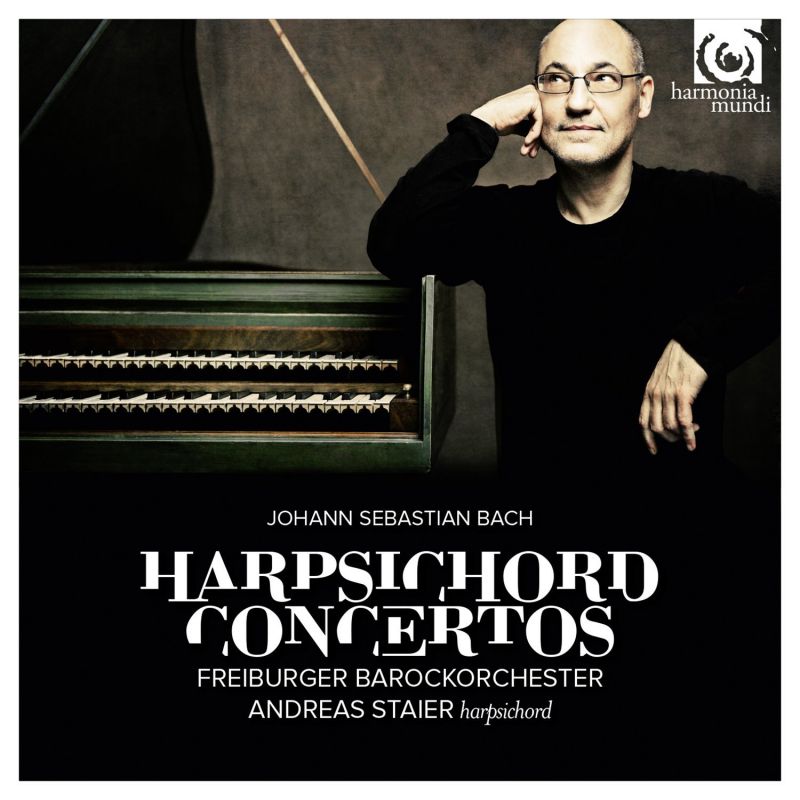JS BACH Harpsichord Concertos
View record and artist detailsRecord and Artist Details
Composer or Director: Johann Sebastian Bach
Genre:
Orchestral
Label: Harmonia Mundi
Magazine Review Date: AW2015
Media Format: CD or Download
Media Runtime: 109
Mastering:
DDD
Catalogue Number: HMC90 2181 2

Tracks:
| Composition | Artist Credit |
|---|---|
| Concerto for Harpsichord and Strings |
Johann Sebastian Bach, Composer
Andreas Staier, Harpsichord Freiburg Baroque Orchestra Johann Sebastian Bach, Composer Petra Müllejans, Director |
Author: Jonathan Freeman-Attwood
Andreas Staier’s studied claveciniste dexterity and rich-paletted approach reinforce the matter with his deeply resonant Parisian copy of a Hass instrument from Hamburg, dating from exactly the time when Bach, his sons and pupils would have been dancing their way through these works in Zimmermann’s Coffee House on Sunday afternoons. Dancing, however, is not a primary ingredient in Staier’s vocabulary, and it takes some time to adapt to a deliberate conceit of sustained rigour and gravitas. At its best, the focused determination in the great solos of the D minor (BWV1052) wrest this music from glibness or mannerism towards Bach’s core contrapuntal and harmonic priorities.
Likewise, there’s a gloriously authoritative narrative brought to the concise F minor (BWV1056), through Staier’s cultivated means of connecting ideas without yielding to sentimentality. The line is often fine, because the G minor (BWV1058, a parody of the A minor Violin Concerto) feels as if a mathematical proof is being presented, the orchestra too easily alighting on tried-and-tested instincts. Both these concertos, incidentally, introduce cadenzas in their last movements (where the quasi-fermatas would suggest) to great effect.
Despite the driven and occasionally frenzied bass-lines and the prevalence of couplings that give the harpsichord an unusual presence, the thinned-out E major Concerto parades a conceit of true elegance. The courtliness of the middle movement finds a stately cousin in the burnished reading of the D major (BWV1054), despite a return to the decidedly scrambled and anti-balletic approach to the last movement. Indeed, the refined etching of the second movements – relatively speaking those places which Bach finds least arresting – is one of the greatest achievements of Staier and his colleagues: the D major example is a dark lamentation of profound affect, highly wrought by the soloist’s deft timing and the orchestra’s ambition to enter his still emotional world.
If you’re looking for fun, abandon, lyricism, radiant lift-off (which I miss most of all in the A major, BWV1055) and luminosity, then maybe this is not for you. However, it’s still probably the most brilliantly executed of any version in the catalogue, one whose tough, intellectual, aesthetic and geometric logic celebrates Bach with sustained and impressive consideration.
Discover the world's largest classical music catalogue with Presto Music.

Gramophone Digital Club
- Digital Edition
- Digital Archive
- Reviews Database
- Full website access
From £8.75 / month
Subscribe
Gramophone Full Club
- Print Edition
- Digital Edition
- Digital Archive
- Reviews Database
- Full website access
From £11.00 / month
Subscribe
If you are a library, university or other organisation that would be interested in an institutional subscription to Gramophone please click here for further information.




